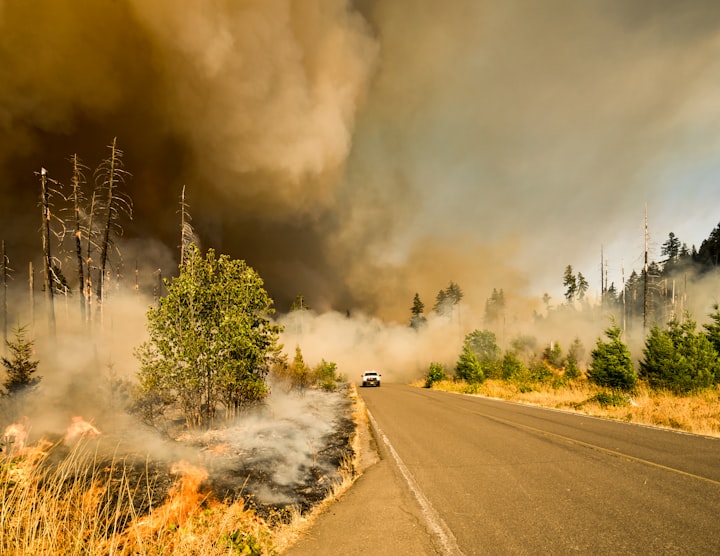WILDFIRE
Wildfire and it's effects on the society.

Wildfires, often referred to as uncontrolled fires or forest fires, have been a significant natural hazard throughout human history, profoundly impacting societies and ecosystems around the world. These destructive events, fueled by a combination of dry conditions, high temperatures, and human activity, can have far-reaching and devastating effects on societies. From the immediate threat to lives and property to the long-term consequences on the environment, economy, and public health, the impacts of wildfires are complex and multifaceted.
The immediate impact of a wildfire on society is the threat it poses to human lives, homes, and infrastructure. As flames rage across forests, grasslands, or urban areas, the safety of residents and first responders is paramount. Evacuations, often conducted under chaotic and stressful conditions, can displace thousands of people, disrupting their daily routines and straining local resources. The destruction of homes, businesses, and critical infrastructure like power lines and roads can leave communities vulnerable and incapacitated, further complicating emergency response efforts.
Beyond the immediate dangers, the environmental and ecological consequences of wildfires can reverberate through society for years to come. These events can destroy vast stretches of forests, disrupting ecosystems and biodiversity. Native plant and animal species can be displaced or even driven to extinction, leading to imbalances in local ecosystems. The loss of vegetation can also exacerbate soil erosion, leading to degradation of watersheds and increased risks of floods and landslides. In addition, the release of vast amounts of carbon dioxide into the atmosphere during wildfires contributes to global climate change, impacting societies on a global scale.
The economic toll of wildfires is another critical aspect of their effects on society. The costs of firefighting efforts, emergency response, and post-fire recovery can strain local, regional, and national budgets. Losses in agricultural productivity, timber resources, and tourism revenue can have long-term economic consequences for affected areas. Insurance premiums can rise, and property values may decline in fire-prone regions, impacting homeowners and investors. Moreover, businesses can suffer from supply chain disruptions, reduced consumer spending, and infrastructure damage, affecting the livelihoods of countless individuals.
Public health is also at risk during and after wildfires. The inhalation of smoke and airborne particulates can lead to respiratory problems, especially for vulnerable populations such as the elderly, children, and individuals with pre-existing conditions. The destruction of water treatment facilities and contamination of water sources can compromise access to clean drinking water, increasing the likelihood of waterborne diseases. Mental health issues, including anxiety, depression, and post-traumatic stress disorder, can also arise among those directly impacted by the fires and the subsequent recovery process.
Societal responses to wildfires involve a complex interplay of disaster preparedness, response, recovery, and mitigation efforts. Governments, communities, and individuals play crucial roles in minimizing the effects of wildfires on society. Land-use planning and zoning regulations can help reduce the risk of wildfires by limiting development in high-risk areas and promoting fire-resistant building practices. Early warning systems and evacuation plans are essential for safeguarding lives during wildfire events. Investing in fire suppression and firefighting resources, such as equipment and trained personnel, is paramount for containing and extinguishing fires before they become catastrophic.
Long-term mitigation strategies are equally important in addressing the societal impact of wildfires. Forest management practices, such as controlled burns and selective logging, can help reduce fuel loads and prevent the uncontrolled spread of fires. Reforestation efforts can restore damaged ecosystems and improve resilience against future wildfires. Public education campaigns can raise awareness about fire safety and prevention, encouraging responsible behavior in fire-prone areas. Additionally, global efforts to address climate change and reduce greenhouse gas emissions are crucial in mitigating the conditions that contribute to the frequency and severity of wildfires.
In conclusion, wildfires exert profound and interconnected effects on society, spanning from immediate threats to lives and property to far-reaching consequences for the environment, economy, and public health. The intricate web of impacts necessitates a multifaceted approach to preparedness, response, recovery, and mitigation efforts. As societies continue to grapple with the challenges posed by wildfires, collaboration among governments, communities, and individuals remains essential in minimizing the devastating effects of these natural hazards. Through sustained efforts to prevent and manage wildfires, societies can work towards a more resilient future in the face of this ongoing threat.






Comments
There are no comments for this story
Be the first to respond and start the conversation.